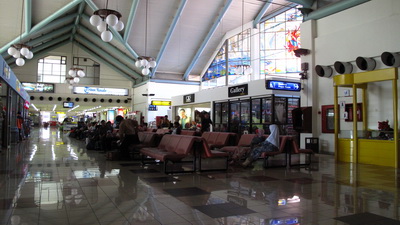The tip of North Sulawesi lies just above the equator and is therefore subject to the two main seasons – wet and dry…
The dry season is from April to November when the wind blows from the southeast, the water temperatures are around 30 deg C and the seas are usually calm with visibility up to 30m.
The wet season is from December through to March with cooler winds from the northwest that can bring heavy rain & rougher seas and the water temperatures are around 25 deg C, with visibility around 15m
Diving Indonesia: North Sulawesi – How to get to Bunaken

North Sulawesi has its own international airport at Manado, which makes it relatively easy to get to compared to some of the other main diving locations in Indonesia.
However… the only direct international flights are from Singapore with Silk Air four times a week, although Air Asia used to fly to Manado as well but stopped doing so in 2010.
Manado is also easily accessed from both Jakarta and Bali – although that usually involves a short stop at Makassar (Ujung Pandang) in South Sulawesi.
Diving Indonesia: North Sulawesi – Where to Stay?
There literally are dozens of places to stay if you planning to dive Bunaken Marine Park, ranging from on the actual islands to in Manado itself.
The benefit of staying on either Bunaken Island or Siladen Island is that you are closest to the best dive sites such as Timur 1 & 2 and Fukui, whereas if you stay in Manado be prepared for a lot of time in transit…
I chose Cocotinos Dive Resort because it was an excellent compromise in that it is located at Wori Bay, which is close to Manado airport and meant a short transfer time, but only about a 40 minute boat trip to the best locations on Bunaken Island. Plus as I later learned there are several critter sites close to the resort, so late afternoon and evening dives to do a spot of critter hunting are very easy.
Another major advantage is that because Cocotinos is at Wori Bay, a day trip over to the Lembeh Strait is not a big deal and involves a journey of about 1.5 hours each way.
[slideshow id=77]
Cocotinos Image Gallery
Diving Indonesia: North Sulawesi – Bunaken Marine Park Fees…
One of the very first things you will have to do on arrival at Bunaken is pay the Rp 150,000 (A$20) National Park fee. This gets you a waterproof plastic tag and a cable tie, which allows you to dive in the park for the calendar year you are in and is issued by the resort or liveaboard you are using.
Park rangers are out everyday checking that people using the park have their tags.
Modeled on a system first developed on the Caribbean island of Bonaire, the basic concept is to collect money that the Bunaken Management Advisory Board can use to fund conservation & village development projects in the park.
The Advisory Board is comprised of the North Sulawesi Watersports Association, representatives from the 30 villages in the park, local tourism, fisheries & government environmental agencies and the local university’s marine sciences department. Projects funded by the board have been principally focused on the most urgent conservation issues in the marine park, such as initiatives to eliminate destructive fishing practices like dynamite & cyanide fishing and other illegal activities such as mangrove cutting & capture of endangered wildlife such as turtles and dugongs.
The second priority has been village development programs such as mangrove replanting, conservation education for children, and construction of public wells, community information boards, docks, toilet facilities, and garbage disposal areas.
The issues of toilet facilities & garbage disposal are very significant as any look at older guide books on the area will show. Bill Dalton in his Indonesia Handbook, which was published in late 1995, talks of the villagers on Bunaken Island using their beaches as both toilets and rubbish dumps. When questioned as to why they did this in such a pristine area, responded by saying “nanti”, which means come back later after high tide and it will all be gone…
More detailed information on the activities of the Advisory Board and its use of the park fees is available at www.bunaken.org
Back To: Bunaken Critters
Back To: North Sulawesi Overview
